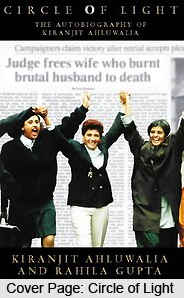 Kiranjit Ahluwalia is a female social activist who attracted a vast amount of international publicity after immolating her husband during 1989, as a reaction against ten prolonged years of sexual abuse, mental and physical abuse. Initially, she had been sentenced to life imprisonment after she was charged with killing her own husband. However, later the conviction was reversed and declared as `manslaughter`, due to a lack of proper legal practitioner. A movie known as `Provoked` has been made in the year 2006, which portrays the circumstances and incidents which finally led to the murder, accomplished by Ahluwalia. The film was screened at the 2007 Cannes Film Festival, wherein the role of Kiranjit Ahluwalia was enacted by Aishwarya Rai and actor Naveen Andrews had played the role of Deepak Ahluwalia.
Kiranjit Ahluwalia is a female social activist who attracted a vast amount of international publicity after immolating her husband during 1989, as a reaction against ten prolonged years of sexual abuse, mental and physical abuse. Initially, she had been sentenced to life imprisonment after she was charged with killing her own husband. However, later the conviction was reversed and declared as `manslaughter`, due to a lack of proper legal practitioner. A movie known as `Provoked` has been made in the year 2006, which portrays the circumstances and incidents which finally led to the murder, accomplished by Ahluwalia. The film was screened at the 2007 Cannes Film Festival, wherein the role of Kiranjit Ahluwalia was enacted by Aishwarya Rai and actor Naveen Andrews had played the role of Deepak Ahluwalia.
Background of Kiranjit Ahluwalia Case
During 1979, Kiranjit moved to the United Kingdom along with her husband Deepak, at the age of 23, from the ancestral home in Chakkalal, Punjab. She was a victim of continued domestic abuse for ten years, which included marital rape, deprivation of food and extreme physical violence. Even her family refused to cooperate with her, persuading her to ignore her husband`s repeated assaults, to preserve her family honour. She tried to retreat, but was brought back by her abusive husband. Two sons were born to her who witnessed the violence she suffered. In 1989, Kiranjit was brutally attacked by Deepak who allegedly tried to burn her face with hot iron and break her ankles, in an attempt to extricate money from her family.
 Enraged, Ahluwalia poured caustic soda and petrol over her husband who was asleep, setting his bed on fire. Thereafter, she ran into the garden with her son who was aged three. Consequently, her husband met his end after 10 days as he received over 40 percent burns, which had led to sepsis.
Enraged, Ahluwalia poured caustic soda and petrol over her husband who was asleep, setting his bed on fire. Thereafter, she ran into the garden with her son who was aged three. Consequently, her husband met his end after 10 days as he received over 40 percent burns, which had led to sepsis.
Immediately, she was charged with murdering her husband and the jury contained a majority of white men who argued that it was a cold blooded assassin as she had waited for the opportune moment for the killing. Her lawyers undermined the level of physical abuse she endured and the prosecution stated that the murder was motivated by her envy which was a result of Deepak`s several love affairs. Finally, the Southall Black Sisters (SBS) appealed for a mistrial, after the case was brought to their knowledge. Kiranjit did not possess the knowledge that she was entitled to plead guilty to manslaughter. Her new counsel asserted that she killed her husband in an act of self-defence as she was engulfed by severe depression which impaired her capability to make proper decisions.
Impact of Kiranjit Ahluwalia
Ahluwalia`s case enabled the amendment of certain laws related to domestic abuse in United Kingdom and helped enhance awareness of domestic assault in families of non-English speaking immigrants to Western nations. `R V Ahluwalia` is the name of her case, particularly in the legal books of Britain. The word `provocation` underwent a brand new significance, especially in cases of intensely injured women, which eventually re-categorised her crime as `manslaughter`, rather than culpable homicide or murder. Recognising her boldness, she received the first Asian Women Awards which was awarded to her to admire her "strength, personal achievements, determination and commitment" which was successful in presenting the plight of battered women as a consequence of domestic violence.
She co-authored an autobiographical book known as `Circle of Light`, along with Rahila Gupta. A movie called `Unprovoked` was made for the documentary program named `Despatches` by Gita Sahgal, recollecting the tragic experiences of Kiranjit Ahluwalia.






